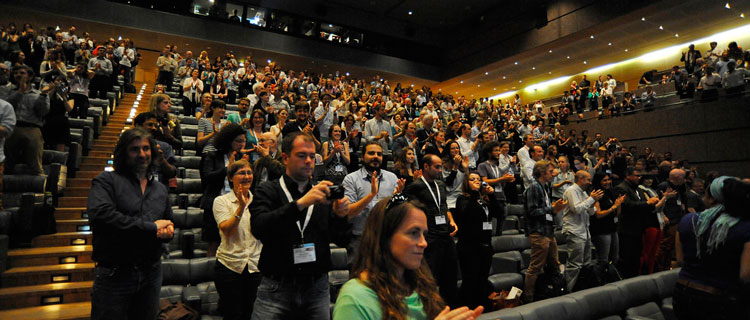
Montpellier Resilience conference 2014
Resilience for what and for whom?
Reflections on the third international conference on resilience
- Large part of the conference focused on transformations and who gets to define what is a desirable future and the appropriate steering mechanisms
- Conference also saw wide acknowledgement that different disciplinary perspectives approach resilience in different ways
- The Student Organising Committee (SOC) received particular praise for its work
Between 4-8 May, the third international conference on resilience took place in Montpellier, France. With more than 900 researchers, practitioners and students coming from around the world , the conference was this year’s gathering for discussions on resilience, transformation, development and conservation.
Under the heading "Resilience and Development: Mobilizing for Transformation", the conference highlighted case studies and new methodologies to navigate change and support decision-making based on social and ecological considerations. Session formats varied from more traditional talk format to speed talks, panels and interactive role play games.
A wicked problem
Addressing environmental change is increasingly being viewed as a ‘wicked problem’, whereby a single optimal intervention or outcome is often not possible due to changing contexts, complexity, and uncertainty. The Resilience 2014 conference embraced this framing with several speakers discussing how we should consider multiple pathways in a variety of contexts that are able to respond to challenges across local, regional, national and global scales.
Brian Walker, a senior research fellow at the centre and a member of the Resilience Alliance hit the nail on the head when he explained how we should not try to choose one optimal trajectory for the future, as context will change. Instead, we should consider where we don’t want to go and try to steer social-ecological systems in trajectories that will avoid what he called ‘undesirable states’.
Participants picked up on this point, with plenty of discussions throughout the conference asking who gets to define what is desirable or undesirable and the appropriate steering mechanisms.
Resilience for what and for whom?
In their plenary session, centre director Johan Rockström and Melissa Leach, discussed the challenges of acknowledging a diversity of sustainability pathways while staying within planetary boundaries.
Melissa Leach, newly appointed Director of the Institute of Development Studies in the UK, highlighted how we need to account for conflict, tensions and trade-offs in human development and conservation planning, an issue that kicked off further discussions around the role of equity, opportunity, power, justice and action. An excellent rundown of the plenary can be found here.
The plenaries also triggered questions concerning "resilience of what and for whom?". A first step towards addressing these questions starts with a more open conversation about how people define resilience within their different contexts.
There was wide acknowledgement at the conference that the different disciplinary perspectives approach resilience in different ways, yet few of the speakers defined what it meant for their research or how they were applying the concept in research design, analysis, or practice.
The next generation
At the conference, the Student Organising Committee (SOC) received particular praise for its work.
A particular highlight was the interactive roleplaying session involving the audience in a discussion around whether we are moving from specialist to interdisciplinary to 'undisciplinary' research, and ultimately emphasising the importance of needing young scholars who specialise and connect the dots across disciplines.
SOC was an integral part of the conference, organising student activities, providing support and insight into their own experiences, as well as voicing (largely female) student feedback and opinion in the closing ceremony (in response to the presence of only one female plenary speaker out of a total of eleven).
This summary is an edited version of the blog post “Resilience 2014: Multiple pathways for resilient social-ecological systems” written by Rebecca Jarvis and Carina Wyborn for the International Network of Next-Generation Ecologists.Read their post here






